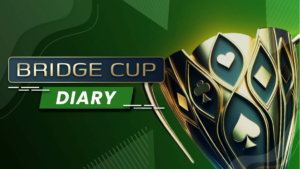
The key play

Who said that only great champions can write bridge articles? Funbridge launched a brand-new format of article a few months ago. You, talented players, will be our bridge authors and give your expert opinion about deals of particular interest to you. We are delighted to share a fascinating article written by a member of our community just below.
Focus on the author

Yoram Aviram is an experienced bridge player and a former member of the Israeli Junior and Open teams with several achievements on the national and international scenes.
Yoram left the game many years ago to focus on family and work (in the field of computerised trading of financial instruments) and switching hobbies from the mind sport of bridge to the physical sport of competitive road cycling.
He is now returning to his old passion and has adopted Funbridge as the platform on which to refresh his old skills.
He is happy to share deals of particular interest with the Funbridge community on the blog.
Milan Macura’s Tournament – The key play
My favourite tournaments on Funbridge are Milan Macura’s tournaments. Milan, a Czech professional player and a genuinely nice guy, is involved in various internet bridge activities. “Milan Macura’s tournaments” are featured on the Funbridge YouTube channel, where Milan plays the hands and explains his actions.
The following hand was played in one of Milan’s “Olympic Esports Week” MP tournaments. It involves some lucky card placement and a nice play technique.
As the dealer I hold the following cards:

A bit above the range of a 1NT opening bid, I open 1♣, intending to jump to 2NT over partner’s 1 level response. Partner however responds 1NT, which I raise to 3. East leads the ♠2 and those are North-South’s cards with North as declarer:


The contract seems safe enough. Spades will probably provide 3 tricks (with a second-round finesse of East’s expected honour). Hearts will provide 2 top tricks. Clubs will almost certainly provide 4 or 5 tricks, and 1 trick can be developed in Diamonds. That makes 10 or 11 tricks depending mainly on the Clubs position. The scoring is Matchpoints, so overtricks are very important.
I start by playing a low spade from dummy, West produces the 7, which I win cheaply with the 9. It seems that East led from 4 cards to the QJ. I play the Club 7 from hand, East plays the 8, the Q from dummy, the 3 from West. I try the Ace of Clubs on which West discards a spade. I play another club to East’s K, West discarding another spade, probably his last one. East now plays the Heart 10. This is the position:

Is East underleading the Heart Q? If he is, I can play low from dummy, win the J and a total of 11 tricks. At first sight, it appears that I have nothing to lose by playing a low heart from dummy. If West has the Q, it is unlikely to be doubleton, otherwise East would have led a Heart from a 5-card suit. There is no apparent source for an alternative 11th trick.
On further thought however, there is a possible play for an 11th trick if West, in addition to the heart Q, also has the A of Diamonds.
Since it is usually better to assume that opponents don’t just give away tricks, I believe it is much more likely that East didn’t underlead the heart Q, so I decide to play West for the two red key-cards. I win the heart A in dummy, West following with the 2. Now, the key play: a small diamond from dummy. West plays the 10, North the K and East the 3.
Success! West has the Diamond A and is going to be strip-squeezed and thrown in to play under his Heart Q. Of course, it wouldn’t have helped West to immediately take his Diamond A as that will allow me 2 diamond tricks. Now I just have to watch the discards. I play the Club J, East discards the Diamond 2, West the Diamond 4. Both opponents echoed in Diamonds, so they are 4-4 or 6-2 (6 at West’s). On the A of Spades, West discards the Diamond 7, and on the next Spade to dummy’s K, he discards the Diamond 8. West already showed 4 small diamonds, I know he still has the A, and from opponent’s spot cardings, I assume that West’s last 4 cards are A and another Diamond, Q and another Heart.
I now play the Club 6 from dummy, and West is forced to either bare his Heart Q or his Diamond A. West elects the latter, discarding the Diamond J. I now I play the Diamond Q to West’s Ace and he exits with the Heart 8, North’s J winning the trick.
That was the position with cards exposed before the key play:

A small diamond is played from dummy. West is forced to play low, otherwise declarer will have 2 diamond tricks.
That is the position when the last club is played from dummy:

To keep his heart guard, West is forced to discard his Diamond J, after which he is thrown-in to underlead his Heart Q.
11 tricks are worth 98.2% (10 tricks were worth 56.7%). A nice reward for that extra trick and a significant help to a 74% result and 1st place in the tournament!
What is the concept behind the community articles?
Would you like to write an article too? We at Funbridge like giving our players a voice. Here is a format of articles written by the players themselves. If you see a deal of particular interest and you want to share it with the Funbridge community, tell us in the Comments section below! We will get back to you soon.

Content Manager
What did you think about this article?
Share your opinion in the Commentary Section below!




Well explained interesting hand.
One question: opponents really had to give an honest count in diamonds?
Is it possible to use in these articles the same type of cards that are used when we play?
You are right. Against human opponents, you normally can’t rely on their count signals, and against good opponents, you often have to guess their distribution. At Funbridge, Argine’s count signals give an “artificial” edge.
On this hand, however, the count wasn’t necessary. West’s four Diamond discards mean he has just the lone A remaining (otherwise he would have 7 nice diamonds and a doubleton heart, which is inconsistent with his bidding and East’s lead).
I had no idea that the hands in that tournament (which existence I didn’t know about) were played against bots.
One final point (which was very well stressed by the author): counting is one major key to success.
When asked about the best way to improve, one world class player once told me:
Count
Everything
Always
Wonderful advice!
Wonderful analysis!